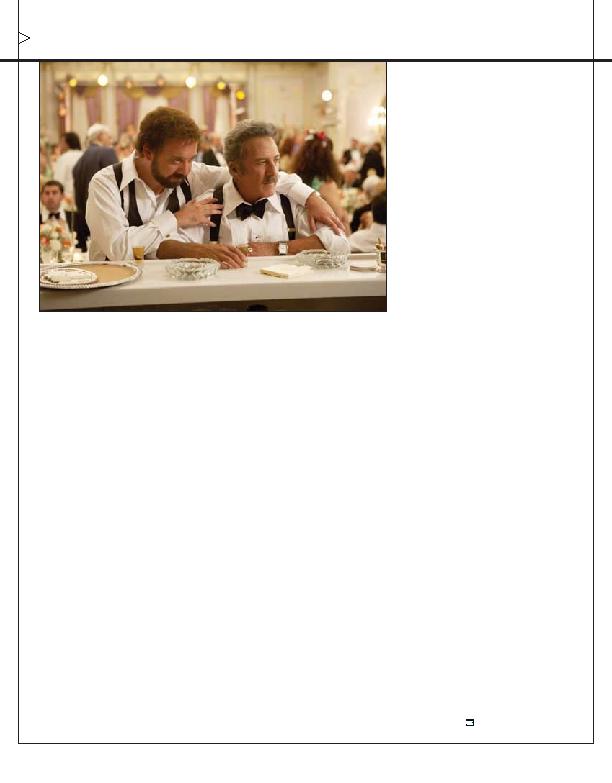
while he worked as an assistant to Canadian
filmmaker Christian Duguay (Hitler: The Rise
of Evil). One of his duties entailed reading
through the myriad screenplays sent to the
director by his agency. It was in these pages
that Konyves gradually realized he might
have the stuff to be a professional screen-
writer. "I read a lot of bad scripts," he recalls.
"I thought, `These are getting bought by
somebody. I can certainly write a script this
bad. And if I could get paid for it, that would
be great!'"
the first script he wrote to Summit Entertain-
ment. "I could quit my job and pay the rent
for my studio apartment for a year," Konyves
says. Keeping a roof over his head beyond
that first year, however, would require
Konyves to write the kinds of screenplays that
inspired his move to Hollywood. His earlier
titles included Solar Attack and Earthstorm,
which were written quickly, made on the
cheap in Canada (Konyves' citizenship
helped land him these gigs) and aired on SyFy
from time to time. They are not distinguished
pieces of filmmaking, but plugging away kept
the lights on in Konyves' apartment.
out or, worse, diminishes the quality of their
writing. "It's kind of fun to be like, `Holy shit,
I wrote a script in two weeks!'" Konyves says.
"You don't think it's actually possible until
you do it. But then there's also the danger of
when you do it too much, it's like, `This is ac-
tually making me a worse writer at a certain
point.' So you've got to put the breaks on
that and say, `OK, let me try to be fantastic
again.'"
Mordecai Richler's celebrated novel about a
curmudgeonly TV producer moved to re-
count his turbulent, womanizing life when
a tragic event from his past is dug up in the
form of a true crime novel. The central mys-
tery revolves around Barney's involvement
in the shooting death of his friend Boogie,
but the scope of the narrative is much
broader than that -- it's a sprawling yarn
about a man attempting to make sense of his
misspent time on the planet and figure out
how he lost the one person he loved more
than anything.
read the book and found out who had the
tos, a friend of Richler's who had produced
the 1985 big-screen version of the author's
Joshua Then and Now. Recalls Konyves, "I
knew someone who knew him and said,
`Can you get me five minutes with him?'"
Konyves got his five minutes and soon real-
ized that the project meant a great deal to
Lantos, who'd been struggling to get it into
production for 12 years. Konyves impressed
Lantos enough to be granted a shot at giving
notes on the current draft of the screenplay.
that illustrated how he'd pull together the
book's sprawling narrative (told by an unre-
liable narrator) and divergent subplots. "The
book is very, very dense: It's long, it's first-
person, it's written as a memoir, and it's just
really a man's mind poured out on paper --
with tangents everywhere and every person
he's ever met from the time he was 20 until
he dies. And he has Alzheimer's so he's losing
his memory as he's writing."
proved to be a struggle. "I was very excited
about getting the job because I really loved
the book," Konyves says. "And then when
I got the job, I completely crumbled. I did-
n't write a word for the first month. I knew
I had three months to hand it in and for
the first month I was completely paralyzed.
I was like, `I figured out how to do the
structure, but I don't know what happens
in between anything!' Then, little by little,
I started writing. I wrote the first draft in
three months. And until we got a draft that
we went with to the actors was a year. It
was basically two years from the time I was
bought on to the time we were shooting."
cameras. "I was around for the entire pre-
production, on set every day, and was even
around for the postproduction -- which is
rare and will probably never happen to me
again. So I knew to take advantage of it."
his earlier SyFy efforts? "People tell me,
`You might want to take them down,'"
Konyves says. "Fuck that! I am very proud
of paying the rent writing. There is ab-
solutely no shame. Not everyone comes
out of the gate winning Oscars or writing
masterpieces."